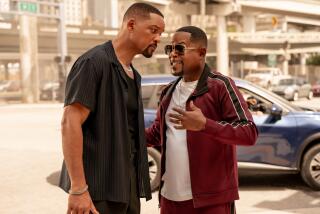Movie review: Cage spins wheels on ‘Ghost Rider: Spirit of Vengeance’
- Share via
It has the makings of a trash-film lover’s idea of heaven. In this corner, the filmmaking team of Mark Neveldine and Brian Taylor, credited as Neveldine/Taylor, purveyors of willful, gleefully disreputable movies like “Crank” and “Crank 2: High Voltage.” They are smart enough to know better and self-consciously shameless enough to go there anyway.
And in this corner is Nicolas Cage, who has over time transformed into a performer of such ridiculous earnestness that it is impossible to unravel whether he gets it or not. Cage is the opposite of irony. Putting the two together for the sequel “Ghost Rider: Spirit of Vengeance” is like a laboratory experiment on how often a movie can spin from bad to good and back again.
The new film covers the back story of how Johnny Blaze (Cage) went from daredevil motorcycle rider to head-on-fire supernatural avenger in a smartly done credit sequence. Things pick up quickly when a drunken French priest (Idris Elba) enlists Blaze and his powers to rescue a Gypsy grifter (Violante Placido) and her son from the mysterious deal-making businessman (Ciarán Hinds) who also rendered Blaze into his current condition. As Blaze asks succinctly, “You’re the devil’s baby-mama?”
Like any deal with the devil, “Spirit of Vengeance” at times makes a viewer regret what they wished for. Working with a script credited to Scott M. Gimple, Seth Hoffman and David S. Goyer leaves Neveldine and Taylor adding their oddball touches around the edges while simply stringing together a series of thudding action set-pieces. The duo’s innate outrageousness also feels neutralized by the film’s PG-13 rating. An effect in which Cage’s skull hollows out into an empty-eyed death-mask is both comic and eerie.
The first “Ghost Rider” film, directed by Mark Steven Johnson, was sort of a fizzy goof, the kind of movie where you don’t expect much and then think, “Hey, that was actually kind of fun.” “Spirit of Vengeance,” though, is undone by increased expectations, as promising more only makes it feel they are somehow delivering less.
More to Read
The biggest entertainment stories
Get our big stories about Hollywood, film, television, music, arts, culture and more right in your inbox as soon as they publish.
You may occasionally receive promotional content from the Los Angeles Times.











